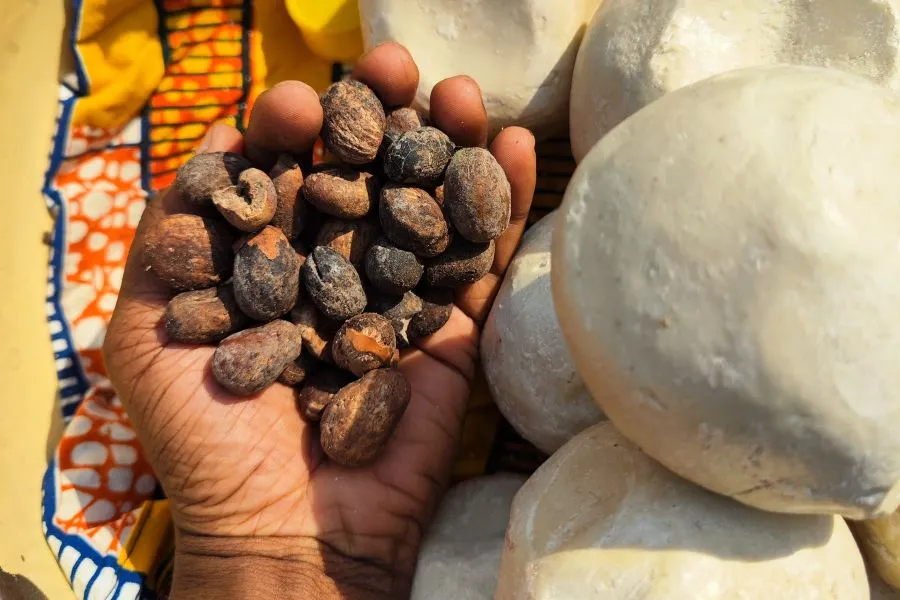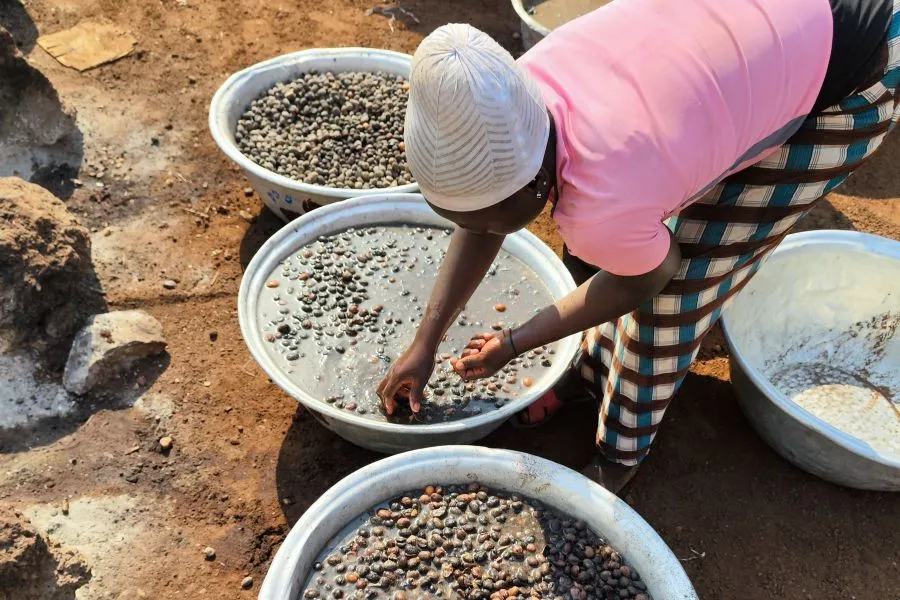Women shea processors’ livelihoods suffer after Nigeria’s export ban backfires
Key takeaways
- Nigeria’s raw shea export ban has reduced women’s incomes by collapsing nut prices and limiting market access.
- The policy aimed to boost local value addition but experts say it lacked planning and support for affected women processors.
- The GSA urges inclusive dialogue and investment to ensure the transition strengthens well-being and sustainability.
Nigeria’s government ban on exporting raw shea nuts has depleted the incomes of the women who collect and sell raw kernels. The August ban was enacted immediately to help the country become a global supplier of refined shea butter.
However, the move has caused a collapse in nut prices and reduced market access for the women who rely on the trade for their livelihoods. Women make up approximately 96.2% of shea processors, according to ResearchGate.
Some local processors are benefiting from cheaper supplies, but the ban has reduced earnings for farmers and laborers.
Personal Care Insights speaks to Aaron Adu, managing director of the Global Shea Alliance (GSA), about how the ban has afflicted women in the industry and how new frameworks and policies can support economic and human prosperity.

“Policies intended to increase domestic value addition are legitimate, but timing and design matter. Abrupt measures not paired with support risk harming the very women they intend to help.”
Adu urges the authorities to engage directly with women producer organizations and supply chain actors, publish concrete plans for investment in processing capacity, and adopt short-term protections while the sector adapts.
 Export restrictions leave rural shea collectors struggling.The ban will be reviewed in late February 2026, six months after its inception. The shea market has a strong foothold in the personal care industry. Shea butter is an essential raw ingredient for skin and hair care products such as shampoos, conditioners, and moisturizers.
Export restrictions leave rural shea collectors struggling.The ban will be reviewed in late February 2026, six months after its inception. The shea market has a strong foothold in the personal care industry. Shea butter is an essential raw ingredient for skin and hair care products such as shampoos, conditioners, and moisturizers.
Safeguarding women’s gains
The GSA identifies the biggest risks of Nigeria’s move as immediate loss of cash flow, erosion of bargaining power with intermediaries, and the possibility of distress sales into lower-value domestic channels.
“That loss of income increases household vulnerability and can force women to sell assets or reduce essential spending. There is also a risk that, without clear protective measures, unscrupulous buyers or intermediaries will exploit the disruption and that promised value addition will not materialize quickly enough to replace lost export revenue,” says Adu.
To make value addition equitable for women, the non-profit organization suggests policies including:
- Predictable implementation timelines.
- Transparent mechanisms to protect prices paid to collectors.
- Targeted finance for women-led processors and co-operatives.
- Technical support for quality control, certification, and social protection measures for those who lose short-term income.
“It is essential to ensure that any value addition requirement is accompanied by real investment in processing capacity, access to markets, and training so women benefit rather than being marginalized,” adds Adu.
Wealth and well-being
Nigeria follows other West African countries, such as Burkina Faso, Mali, Togo, the Ivory Coast, and Ghana, that have banned or restricted the export of shea over the past two years.
Consequently, due to the ban, prices have fallen in some local markets, and many informal buying channels have been interrupted as exporters pause purchases.
Some local processors, who have capacity, are seeing increased access to raw material. But the benefit is conditional on investment in processing and fair payment to the women who supply the kernels.
“A just transition for Nigeria’s shea industry means moving toward value addition in a way that protects livelihoods while unlocking the sector’s full potential. The momentum toward value addition at source signals the industry’s potential for sustainable growth that benefits producers, consumers, and the environment,” Adu tells us. Women’s incomes fall after Nigeria’s shea export ban.
Women’s incomes fall after Nigeria’s shea export ban.
He says that realizing the potential of bolstering domestic economic growth and well-being depends on creating an enabling policy environment that attracts investment, protects ecosystems, and empowers women at the heart of the shea value chain.
“This requires a phased, well-communicated transition supported by access to finance, training, and markets so that no one is left behind.”
Adu explains that the most effective way to give women producers and processors a voice in future policy decisions is through an inclusive national dialogue that brings together women’s groups, exporters, processors, and NGOs.
“Policies should build on existing networks and reflect ground realities rather than disrupt them.”
The GSA says governments can support long-term sustainability by combining regulation with investment in seedlings, climate-smart practices, and women’s access to finance and technology.
Adu proposes regional collaboration through the Economic Community of West African States and the African Continental Free Trade Area, which he says can strengthen trade, harmonize standards, and promote shared growth across the shea belt.
International effects
According to the UN, Nigeria is the top shea nut-producing country, followed by Mali, Burkina Faso, Ghana, Côte d’Ivoire, Benin, and Togo.
In August, the VP of Nigeria, Kashim Shettima, said, “The ban will transform Nigeria from an exporter of raw shea nuts to a global supplier of refined shea butter, oil, and other derivatives.”
Shettima said Nigeria accounts for 40% of the world’s shea nut supply but only contributes 1% of the US$6.5 billion global market share in shea products. He explained that the decision was not an anti-trade policy but a “pro-value addition policy designed to secure raw materials for our processing factories.”
The move aimed to boost income and jobs for rural workers. However, based on early results, it has seemed to backfire.
 The GSA tells us about how policy can help make a more equitable supply chain. Adu tells us that international buyers will face contract shortfalls, price volatility, and supply chain uncertainty.
The GSA tells us about how policy can help make a more equitable supply chain. Adu tells us that international buyers will face contract shortfalls, price volatility, and supply chain uncertainty.
“Sustainability and traceability programs rely on stable supply and documented flows: abrupt export restrictions can break traceability chains, complicate certification compliance, and create reputational risk for brands if they cannot demonstrate ethical sourcing,” he says.
“Buyers who depend on Nigerian supply will need to diversify sources or invest in local processing partnerships to maintain long-term, verifiable supply.”
The GSA says it is ready to support constructive dialogue and technical assistance to ensure the transition protects incomes and advances sustainability.
Personal Care Insights previously spoke to the Global Shea Alliance about humanizing the women who produce shea, rather than seeing them as beneficiaries.














